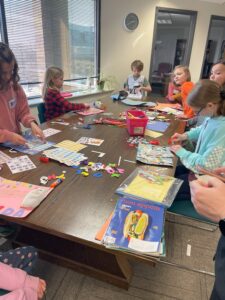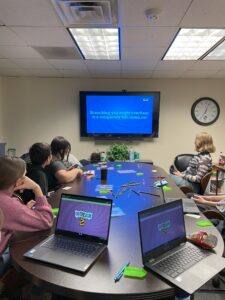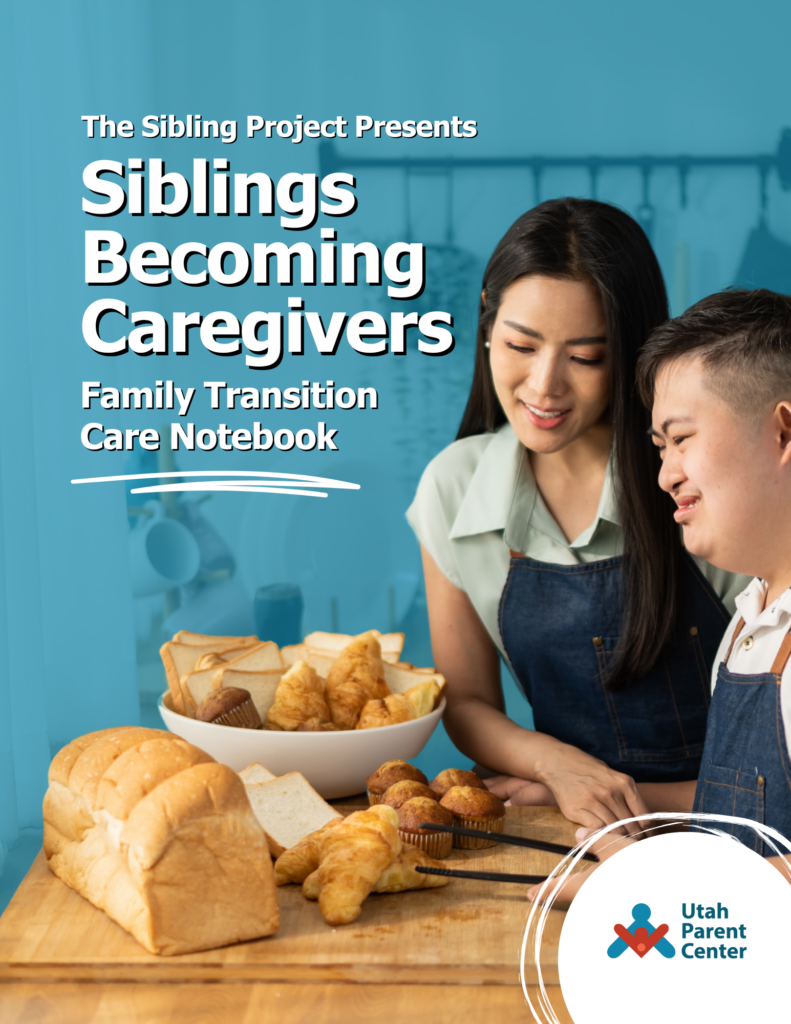The Sibling Project at the Utah Parent Center was built to support Siblings of People with Disabilities throughout their lives. Our project provides information to parents, and adults who are transitioning into the role of caregiver. We also provide free support groups (Sibshops) for school-age siblings of people with disabilities across the state

The Sibling Project




Sibshops are a fun, game-based support group for Siblings of People with Disabilities to connect with one another, make friends, express their feelings, and have FUN!
Sibshops is an official support group curriculum created by Don Meyer in 1982. Meyer’s Sibshops have brought siblings together for decades through his unapologetically fun approach to support groups.
NEW Family Transition Care Notebook!
Caring for a sibling with disabilities can be both rewarding and challenging. Siblings often step into caregiving responsibilities feeling overwhelmed as they navigate complex family dynamics and struggle to find support.
To help make this journey easier, our Sibling Project created the Sibling Project Care Notebook! This is a must-have guide designed specifically for siblings who will be taking over a caregiving role.
What’s inside?
The Sibling Care Notebook covers key aspects of sibling caregiving, including:
- Medical history & emergency contacts – Keep vital healthcare information in one place.
- Legal & financial planning – Understand guardianship, power of attorney, and benefits like SSDI.
- Daily living & routines – Document important details about your sibling’s care needs.
- Supported decision-making – Learn ways to empower your sibling while offering the right support.
Family dynamics & communication – Navigate relationships and work together as a team.
The Sibling Journal

The Sibling Project at the Utah Parent Center partnered with the LEFA Collective, a local guided journal business, founded by a sibling!
This journal features dozens of prompts for siblings of all ages to reflect on their past, present, and future; their emotions; their wants and needs; and have a space that allows them to take the support Sibshops provides, to their home! It can be used as a guided journal, or as an everyday journal, featuring daily pages!
Physical Copies are here!


Resources for Parents & Caregivers
Meeting the needs of multiple children is never easy. It can be especially difficult if one (or more) of your children has special healthcare needs.
Siblings of people with disabilities face challenges every day that shape them into who they are; often being more patient, resilient, and accepting of those around them. These are referred to as Unique Opportunities and are defined as areas of a Sibling’s life and their characteristics that are unique only to them.
Siblings also face Unique Experiences, which are defined as experiences that only Siblings face. These experiences are often identified as resentment, guilt, and trauma associated with their brother or sister’s care.
If a parent doesn’t understand the reasons behind a Sibling’s emotions or behaviors, it can be difficult to navigate situations. Below are resources for parents!
Tips for Debriefing & My Feelings Chart
-This handout is intended to be used as a guide when the household is in distress. Use the tips on the front of the handout to use after an emotional outburst in the family, and let your typically developing child use the feelings chart to identify their needs.
PACER Center – Equal Parenting
Sibling Leadership Network – Resources for Parents and Other Family Members
Sibling Information Needs

“Siblings of children with disabilities have a compelling need for information about the condition of their brother or sister with a disability and its implications.” – Sibshops, Workshops for siblings of Children With Support Needs – Third Edition.
The need for information throughout a Sibling’s life evolves as they get older. Their view of the world gets bigger and they may have more questions about their brother or sister’s diagnosis. It’s important to share relative information with your child when they ask and to keep the topic open and honest at all times.
But what information is appropriate to share with your child, and at what age? Click on the link below to learn more about appropriate information for siblings, and some tips for parents!
Sibling Leadership Network – Sibling Needs Across the Life Course
Siblings Becoming Caregivers
For Siblings, one of the biggest questions asked is, “What will happen when my parents can’t care for my sib?” And that’s a big question to ask, with no certain answer!
In this day and age, psychologists are seeing something called “The Club Sandwich Generation”. For example, Sally lives with her husband and two kids. Her mom also lives in their home and has complex medical needs. So, Sally is not only caring for her children and for her mom. We call this a sandwich caregiver.
A club sandwich caregiver is seen in Sibling’s lives. Andrea also lives with her husband and two kids, and her mom with medical needs, but the difference between Sally and Andrea is that Andrea’s brother with Autism also lives with her and depends on her for care.
Read more about the Club Sandwich Generation HERE
The Sibling Project hosts workshops about the transition from Sibling to Caregiver. Check the events calendar to see when our next workshop will be held.

Adult Sibling Support Facebook Group
The Sibling Project has launched a private Facebook group for Siblings who are 16+ to join and talk to each other about experiences that are uniquely theirs. It’s said that no one knows a sibling, better than another sibling. Join today to connect with others in Utah who get it!

